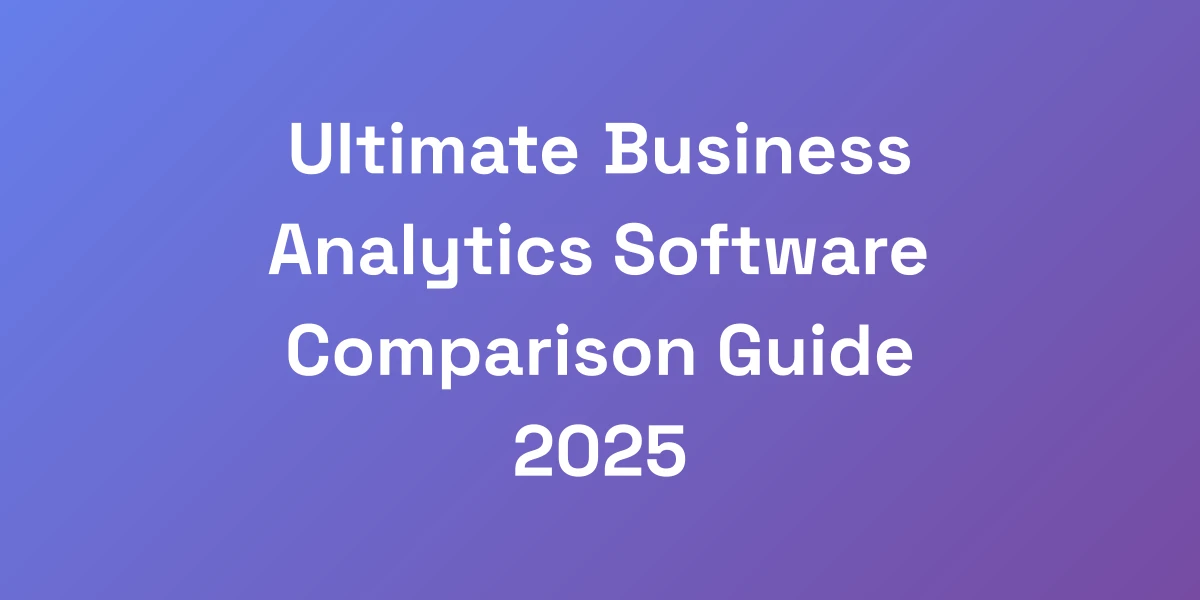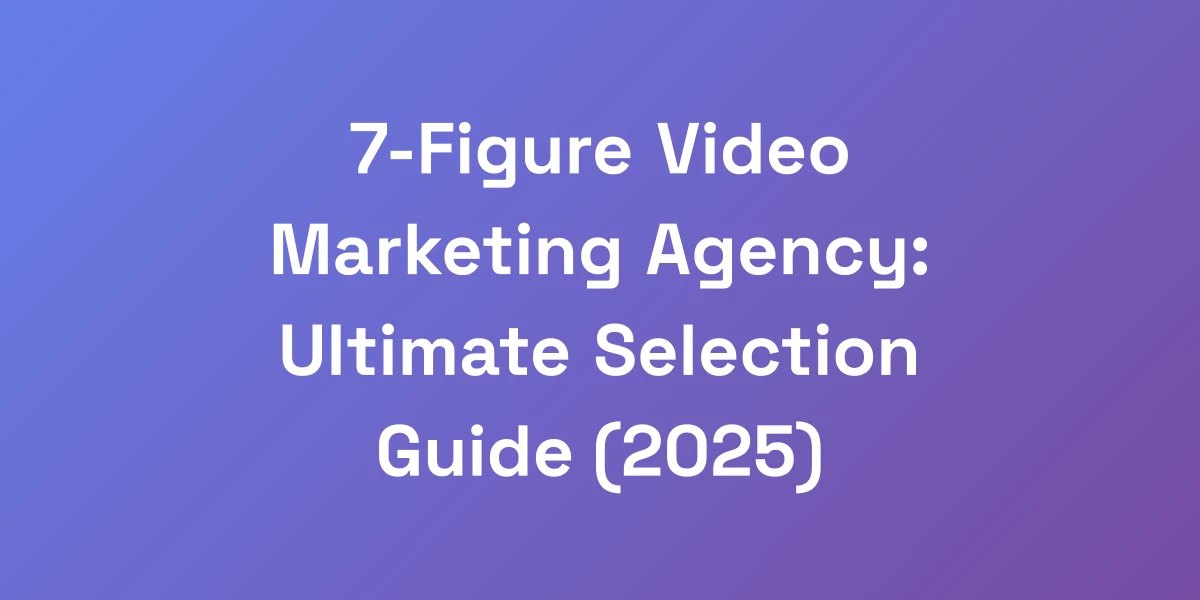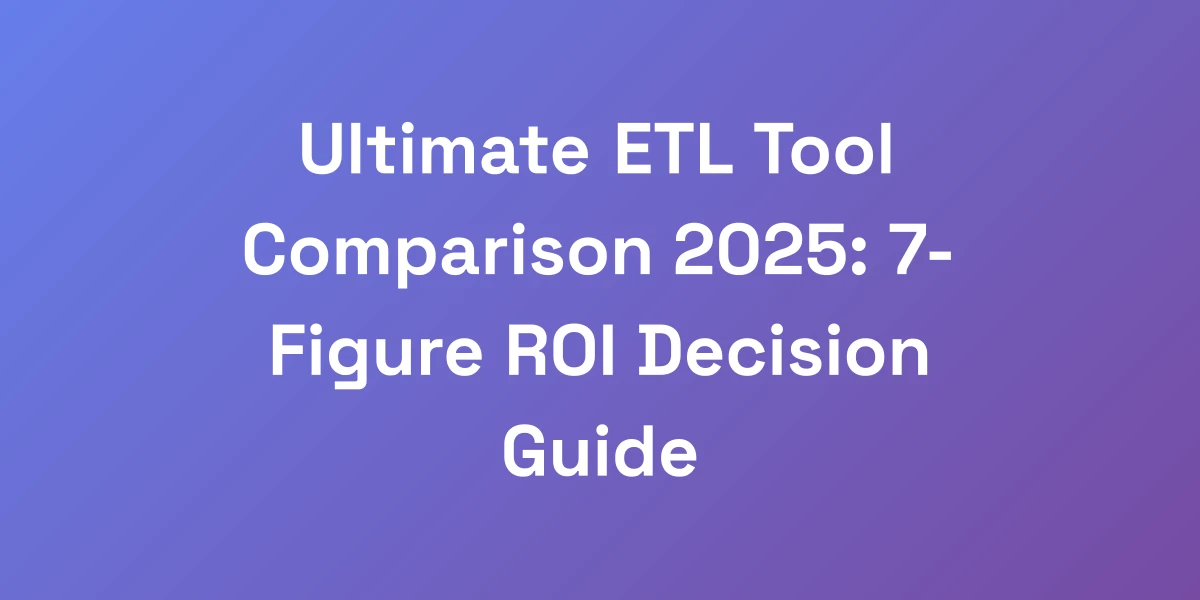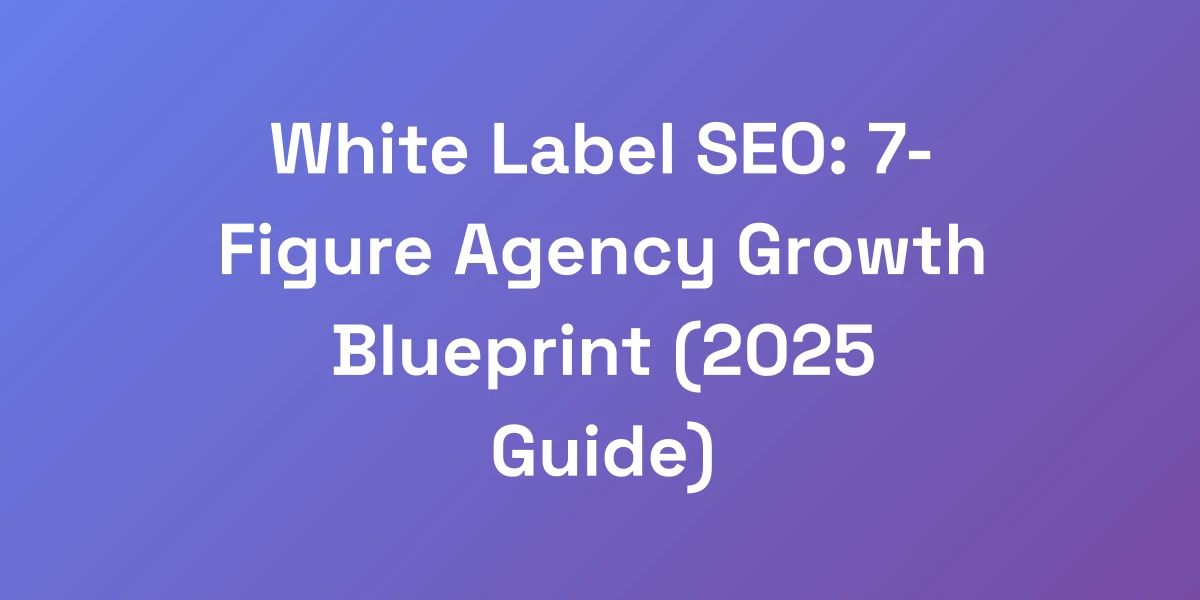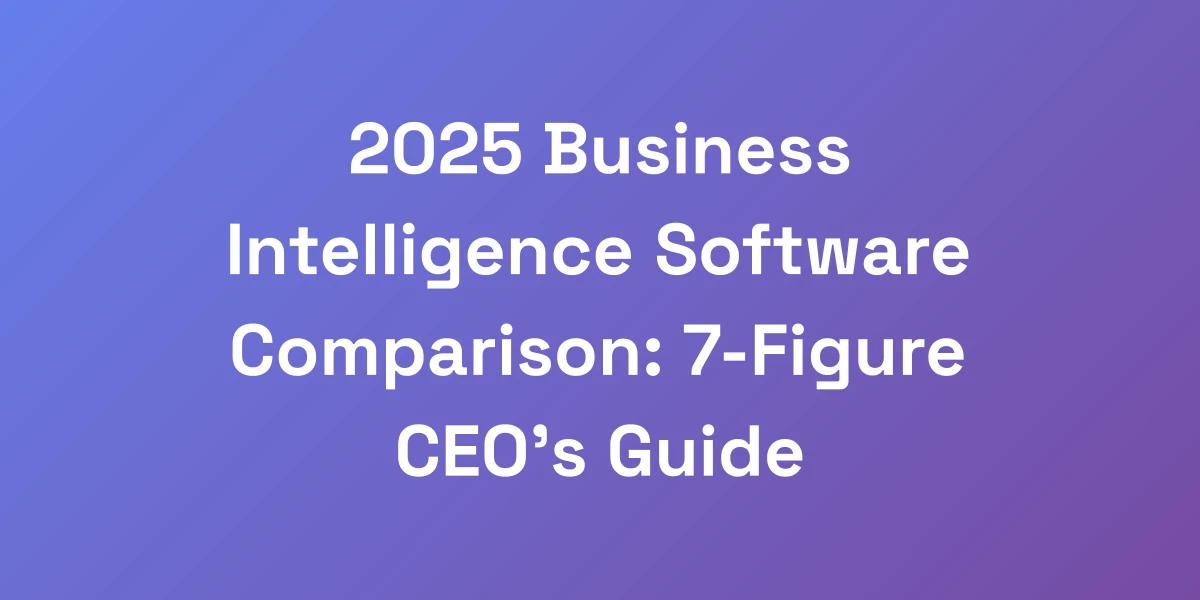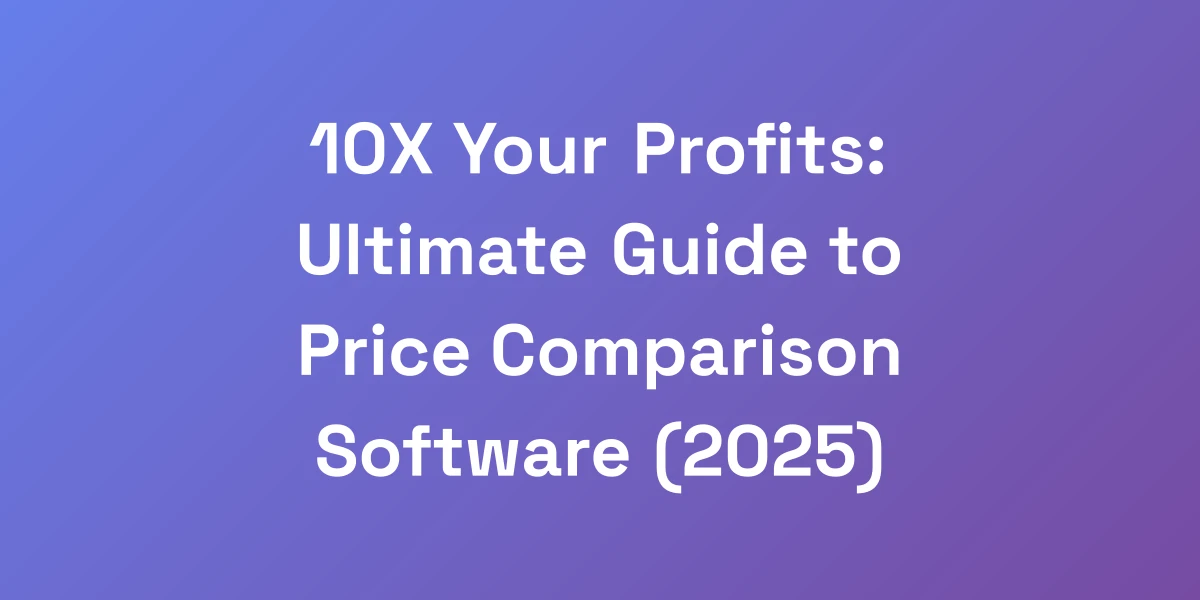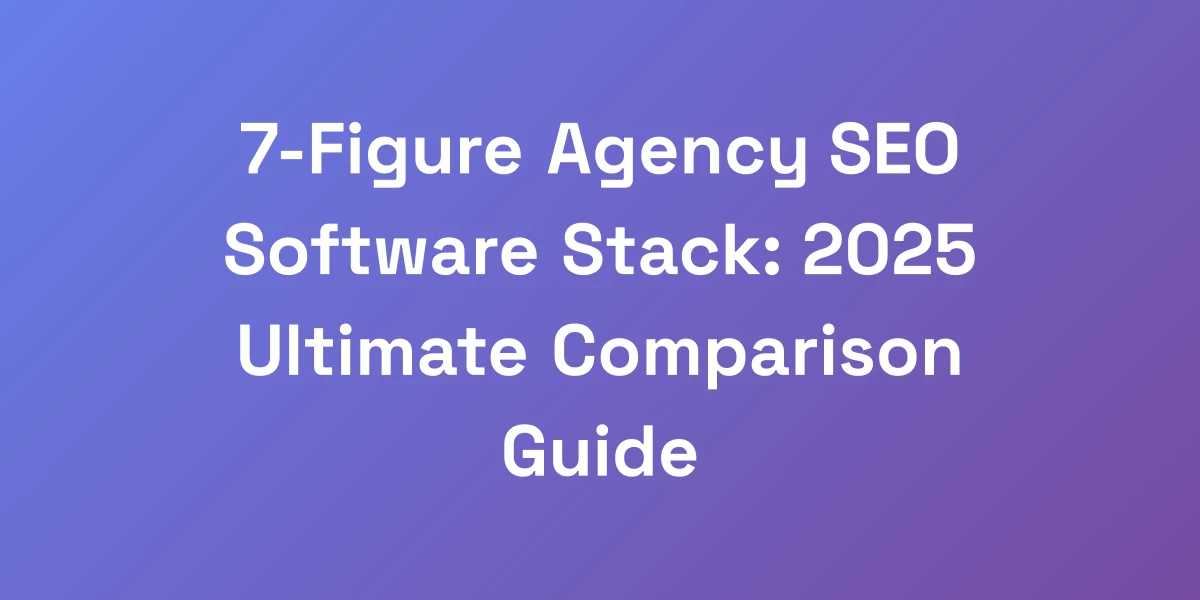
7-Figure Agency SEO Software Stack: 2025 Ultimate Comparison Guide
Feb 27, 2025 | By [email protected]
Why Most Agencies Fail with SEO Software (And How to Fix It)
Let me be direct: 90% of agencies are burning money with their SEO software choices. They’re investing in fancy dashboards that gather dust while their clients demand tangible results.
Here’s the raw truth – it’s not about having the most expensive tools; it’s about having the right stack that generates measurable ROI for your clients. According to a recent SEO software market growth report, the market size is expected to surpass USD 207.41 billion by 2032, driven by the growing demand for AI-driven optimization. We’ve spent over $500,000 testing different SEO software combinations, and we’re here to show you exactly what works and what’s just marketing fluff.
Your SEO software stack is either a profit multiplier or a silent killer – let’s make sure you’re on the right side of that equation.
The Real Cost of Poor Software Selection
Choosing the wrong SEO software isn’t just a minor setback; it can cost your agency thousands of dollars a year.
Imagine investing in a tool that boasts incredible features but lacks the necessary support or integration capabilities. You’re stuck paying for what you don’t use, while missing out on critical functionalities that could drive your agency forward.
Moreover, the time spent navigating inefficient tools takes away from what really matters – delivering value to your clients.
- Lost Revenue: Inefficient tools slow down your processes, delaying client deliverables and potentially pushing them to competitors.
- Wasted Budget: Spending on high-cost tools that don’t deliver expected results drains your financial resources.
- Team Frustration: Complexity and poor user experience can lead to lower team morale and productivity.
Common Agency Software Implementation Mistakes
Many agencies stumble during the software implementation phase, leading to subpar outcomes.
One common mistake is underestimating the training required. You can’t expect your team to master a complex tool overnight.
Another error is neglecting to align the software with your specific agency needs. Off-the-shelf solutions might not always fit our unique workflows and client requirements.
- Lack of Clear Goals: Without defined objectives, it’s easy to misuse features and miss out on key benefits.
- Poor Integration: Failing to integrate new tools with your existing systems can create data silos and inefficiencies.
- Ignoring Scalability: As your agency grows, your software should scale with you, not hold you back.
The ROI-Focused Approach to Tool Selection
When selecting SEO software, focus on tools that provide a clear return on investment. Check out our SEO ROI statistics to understand what metrics matter most.
Start by identifying the key metrics that drive your agency’s success – whether it’s keyword rankings, site audits, or client reporting.
Invest in tools that excel in these areas, ensuring that every dollar spent directly contributes to achieving your goals.
- Measure Effectiveness: Choose tools that offer robust analytics and reporting features to track performance accurately.
- Flexibility: Opt for software that can adapt to your evolving needs, providing the necessary features as your agency grows.
- Support and Training: Ensure the software comes with excellent customer support and training resources to maximize your investment.
Case Study: How Top Agencies Leverage Their Stack
Let’s dive into a real-world example.
Agency X wanted to scale to 7-figures within two years. They overhauled their SEO software stack, focusing on tools that offered automation, comprehensive reporting, and seamless integration.
By implementing Semrush for keyword research, Ahrefs for backlink analysis, and SE Ranking for rank tracking, they streamlined their workflow and enhanced their service offerings.
The result? A 150% increase in client retention and a significant boost in overall ROI, proving that the right software can transform your agency’s trajectory.
The Minimum Viable SEO Software Stack
Not every agency needs a sprawling suite of tools. A minimum viable stack focuses on essential functionalities that drive the most value.
Start with:
- Keyword Research: Tools like Ubersuggest or SE Ranking provide robust keyword data without breaking the bank.
- Site Auditing: Ahrefs or Moz Pro offer comprehensive site audit features to identify and fix on-site SEO issues.
- Rank Tracking: SE Ranking excels here, providing accurate and detailed rank tracking.
- Reporting: Agency Analytics or Raven Tools enable seamless, white-label reporting for clients.
By focusing on these key areas, you ensure that your stack covers the basics, allowing you to deliver consistent and measurable results to your clients.
Core Features Every Agency SEO Software Must Have in 2025
After analyzing hundreds of agency software stacks, we’ve pinpointed the non-negotiable features that separate winners from losers.
These aren’t nice-to-haves – they’re the difference between scaling to 7-figures or staying stuck in the mud.
The market is flooded with tools claiming to do everything, but here’s what actually moves the needle: automated reporting that clients actually understand, scalable site auditing that doesn’t break when you hit 100 clients, and white-label capabilities that don’t look like they were designed in 1999.
Your software stack needs to solve problems, not create them.
Automated Reporting & White Label Capabilities
Clients demand transparency and clarity in reporting. Automated reporting saves time and ensures consistency.
White-label capabilities allow you to present these reports as your own, enhancing your brand’s credibility.
- Customization: Tailor reports to highlight the metrics that matter most to each client.
- Ease of Use: Intuitive dashboards that make complex data easily understandable.
- Automation: Schedule regular reports to be sent automatically, keeping clients informed without manual effort.
Scalable Site Auditing & Monitoring
Your tools should handle growth effortlessly. As you onboard more clients, your site auditing capabilities must scale without compromising performance.
Look for features like:
- Bulk Audits: Conduct comprehensive audits across multiple sites simultaneously.
- Real-Time Monitoring: Continuous site monitoring to catch and rectify issues promptly.
- Detailed Insights: In-depth analysis that provides actionable recommendations.
Client Management & Communication Tools
Effective client management goes beyond SEO metrics. It involves seamless communication and project management capabilities.
Ensure your software stack includes:
- CRM Integration: Manage client relationships and track interactions efficiently.
- Task Management: Organize tasks, set deadlines, and monitor progress within the same platform.
- Collaboration Features: Facilitate teamwork and client collaboration with shared access and communication tools.
Rank Tracking & SERP Analysis
Accurate rank tracking is fundamental for measuring SEO success. SERP analysis provides insights into how your clients’ websites perform against competitors.
Key features include:
- Location-Based Tracking: Monitor rankings in specific geographic areas to cater to local SEO needs.
- Keyword Grouping: Organize keywords into relevant groups for targeted strategies.
- Competitor Analysis: Compare your clients’ performance against key competitors to identify opportunities.
Integration Capabilities & API Access
Seamless integration with other tools and platforms is crucial for a cohesive workflow. Utilizing API documentation tools can enhance your integration process.
Ensure your SEO software offers:
- API Access: Allow custom integrations and data exchanges between different tools.
- Third-Party Integrations: Connect effortlessly with CRM systems, email marketing platforms, and more.
- Data Syncing: Ensure data consistency across all integrated platforms to avoid discrepancies.
Data Visualization & Presentation Features
Presenting data in a visually appealing and easy-to-understand format is essential for client satisfaction.
Your tools should offer:
- Custom Dashboards: Create dashboards that highlight the most important metrics for each client.
- Interactive Charts: Use charts and graphs that allow clients to interact with and explore the data.
- Export Options: Provide multiple formats for exporting data, making it easy to share and present.
Top SEO Software Platforms Compared (Brutal Honesty Edition)
I’m about to ruffle some feathers, but someone needs to say it. Not all “enterprise” SEO tools are worth their salt, and some of the less-known players are absolutely crushing it.
We’ve personally tested every tool on this list with real client campaigns and millions in ad spend.
No affiliate links, no sugar coating – just raw data on what actually works for scaling agencies. For a comprehensive list of the best SEO software for agencies, refer to our extended resources.
Some of these platforms will surprise you, others will confirm what you suspected all along.
The key is matching the right tool to your agency’s growth stage.
Enterprise Solutions (Semrush, Ahrefs, Moz Pro)
These are the giants of the SEO software world, offering comprehensive features that cover almost every aspect of SEO.
- Semrush: Exceptional for keyword research, competitor analysis, and site auditing. Its extensive database and user-friendly interface make it a favorite among agencies.
- Ahrefs: Known for its unparalleled backlink analysis and robust site audit features. Ideal for agencies focusing on off-page SEO strategies.
- Moz Pro: Offers reliable keyword tracking, site auditing, and a strong community for support. Great for agencies looking for a balanced toolset.
These enterprise solutions are powerful, but they come with a hefty price tag and a steep learning curve.
Specialized Agency Tools (SearchAtlas, Hike, Alli AI)
These tools are designed with agencies in mind, focusing on specific functionalities that streamline agency workflows.
- SearchAtlas: Provides advanced keyword research and site auditing features tailored for agency needs.
- Hike: Focuses on team collaboration and project management, making it easier to manage multiple client campaigns.
- Alli AI: Utilizes artificial intelligence to automate tasks like content optimization and performance tracking.
These specialized tools offer niche functionalities that can complement your primary SEO software, enhancing overall efficiency and effectiveness.
Budget-Friendly Alternatives That Actually Work
Not every agency can afford enterprise-level tools. Here are some cheap SEO services that deliver impressive results:
- SpyFu: Offers competitive analysis and keyword research at a fraction of the cost of larger platforms.
- Ubersuggest: A cost-effective solution for keyword tracking, site audits, and backlink analysis.
- Serpstat: Provides a robust feature set including keyword research, rank tracking, and site audits at an affordable price.
These alternatives provide solid functionalities without breaking the bank, allowing smaller agencies to compete effectively.
White Label Reporting Solutions
Providing reports that strengthen your brand is crucial for client retention. Here are some top white label reporting tools:
- Agency Analytics: Offers customizable white label dashboards that can be branded to match your agency’s identity.
- Raven Tools: Provides white-label reporting that integrates seamlessly with other tools, offering comprehensive SEO reports.
- ReportGarden: Allows easy creation of branded reports, making it simple to share insights with clients professionally.
These solutions ensure that your reports not only deliver value but also enhance your brand’s professional image.
Emerging Players Worth Watching
The SEO software landscape is constantly evolving, with new players entering the market regularly. Here are a few emerging tools that show great promise:
- SEOmonitor: Focuses on predictive SEO and performance forecasting, offering unique insights into future trends.
- GrowthBar: Combines AI with SEO tools, providing automated content suggestions and performance tracking.
- Mangools: Known for its user-friendly interface and powerful keyword research tools, Mangools is gaining traction among small to mid-sized agencies.
Keeping an eye on these emerging tools can give your agency a competitive edge by adopting 2025 SEO trends early.
Custom Stack Combinations for Different Agency Sizes
No two agencies are alike, and your software stack should reflect your unique needs and scale.
For smaller agencies:
- Keyword Research: Ubersuggest
- Site Auditing: Serpstat
- Reporting: ReportGarden
For medium-sized agencies:
- Keyword Research: Semrush
- Site Auditing: Ahrefs
- Reporting: Agency Analytics
For large agencies:
- Keyword Research: Moz Pro
- Site Auditing: Majestic
- Reporting: Raven Tools
Creating a custom stack that aligns with your agency’s size and specific needs ensures optimal performance and scalability.
Maximizing ROI: Implementation & Integration Strategies
Here’s where most agencies drop the ball – they buy the tools but botch the implementation.
We’re going to show you the exact process we use to integrate new software into our agency workflow without disrupting existing operations.
This is the difference between a tool being an expense versus an investment.
We’ve developed a proprietary system for training team members, setting up automated workflows, and ensuring client deliverables never fall through the cracks.
Your software stack should work for you, not the other way around.
Step-by-Step Implementation Blueprint
Implementing new SEO software requires a structured approach:
- Assess Needs: Identify the specific needs your agency has and how the new tool addresses them.
- Plan Integration: Develop a plan for how the new tool will integrate with your existing stack.
- Set Up: Configure the software to align with your processes, including setting up user accounts and permissions.
- Test: Conduct thorough testing to ensure the tool works as expected within your workflow.
- Launch: Roll out the tool to your team, ensuring everyone is aware of its purpose and benefits.
- Review: Continuously monitor the tool’s performance and make adjustments as needed.
Team Training & Adoption Strategies
Even the best tools are ineffective if your team doesn’t know how to use them properly.
Our strategies include:
- Comprehensive Training: Offer detailed training sessions covering all features and best practices.
- Resource Availability: Provide access to documentation, tutorials, and support channels.
- Encourage Adoption: Foster a culture that embraces new tools and continuously seeks to improve.
Workflow Automation Setup
Automation is key to maximizing efficiency and reducing manual effort.
Here’s how we set it up:
- Identify Repetitive Tasks: Pinpoint tasks that can be automated, such as report generation or keyword tracking.
- Use Built-In Features: Leverage automatic SEO optimization features offered by your SEO tools, like scheduled reports or alerts.
- Integrate with Other Tools: Ensure seamless data flow between your SEO software and other platforms like CRM systems.
Client Onboarding & Software Integration
Proper client onboarding ensures that your tools are effectively utilized from the start.
Steps include:
- Client Setup: Configure client accounts and integrate their data into your SEO software.
- Customized Reporting: Tailor reports to meet each client’s specific needs and preferences.
- Transparent Communication: Keep clients informed about how you’re using the tools to benefit their SEO strategies.
Performance Monitoring & Optimization
Continuous monitoring is essential to ensure your tools are delivering the desired results.
Our approach involves:
- Regular Audits: Conduct periodic reviews of tool performance and ROI.
- Feedback Loops: Gather feedback from your team and clients to identify areas for improvement.
- Adjust Strategies: Make data-driven adjustments to your SEO strategies based on performance insights.
Scaling Your Software Stack
As your agency grows, your software stack should evolve to meet increasing demands.
Consider the following:
- Upgrade Plans: Move to higher-tier plans that offer additional features and support for larger operations.
- Add New Tools: Introduce new tools that address emerging needs or enhance existing capabilities.
- Optimize Integrations: Ensure that all tools continue to integrate smoothly as you scale, or consider working with the best SEO outsourcing companies.
Future-Proofing Your Agency’s SEO Software Stack
The SEO software landscape is evolving faster than ever, and what works today might be obsolete tomorrow.
But here’s the secret – the fundamentals never change.
We’ll show you how to build a flexible stack that can adapt to algorithm updates and market shifts without requiring a complete overhaul every six months.
This is about building a sustainable competitive advantage, not chasing the latest shiny object.
The agencies that survive and thrive are the ones that can balance innovation with stability.
Emerging Technologies & Their Impact
Technology is advancing at a breakneck pace, and staying ahead means embracing these changes.
- AI and Machine Learning: Tools leveraging AI can offer predictive analytics and more accurate data insights.
- Voice Search Optimization: As voice search becomes more prevalent, tools that cater to this trend will be invaluable.
- Blockchain: Potential for transparency and security in data handling and reporting.
AI Integration & Automation Trends
AI is revolutionizing how we approach SEO, making processes smarter and more efficient.
- Automated Content Creation: AI-driven tools can generate optimized content at scale.
- Advanced Data Analysis: AI can process vast amounts of data quickly, providing deeper insights.
- Personalization: AI enables hyper-personalized SEO strategies tailored to individual client needs. Learn more about autoblogging with AI.
Adapting to Algorithm Updates
Search engine algorithms are constantly evolving, making it essential to have a flexible SEO stack.
- Real-Time Updates: Tools that offer real-time data and alerts on algorithm changes help you stay ahead.
- Agile Strategies: Your SEO strategies should be adaptable, allowing quick pivots in response to updates.
- Continuous Learning: Stay informed about the latest algorithm changes and adjust your tool usage accordingly.
Investment Strategy for New Tools
Investing in new tools should be strategic, ensuring each addition offers tangible benefits.
- Assess ROI: Evaluate the potential return on investment before incorporating a new tool.
- Pilot Testing: Run pilot tests to see how well the tool integrates with your existing stack and meets your needs.
- Scalability: Ensure that the tool can scale with your agency as you grow.
Risk Management & Redundancy
Building a future-proof stack involves managing risks and ensuring redundancy.
- Data Backups: Regularly back up important data to prevent loss in case of tool failure.
- Multiple Tools for Key Functions: Avoid reliance on a single tool for critical functions by having alternatives in place.
- Regular Audits: Conduct periodic audits of your software stack to identify and mitigate potential risks.
Future Industry Predictions
The SEO industry is poised for significant changes in the coming years. Here are our top predictions:
- Increased AI Adoption: More tools will integrate AI to enhance functionality and efficiency.
- Greater Emphasis on User Experience: SEO strategies will increasingly focus on delivering superior user experiences.
- Integration of Augmented Reality (AR):strong> AR could play a role in how users interact with search results, influencing SEO tactics.
By staying informed and adaptable, your agency can navigate these changes smoothly, ensuring long-term success.
Conclusion
Choosing the right SEO software for agencies is a game-changer. It’s not just about the tools, but how you implement and integrate them into your workflow.
We’ve dissected the common pitfalls and provided a roadmap to ensure your software stack works for you, driving measurable ROI and scaling your agency to new heights.
Ready to transform your agency’s SEO strategy? Start by assessing your current stack, prioritize the essential features, and embrace a ROI-focused approach to tool selection.
What challenges have you faced with choosing SEO software? Share your experiences in the comments below or reach out to us for personalized advice.
Let’s build a stack that propels your agency to 7-figure success in 2025 and beyond.

